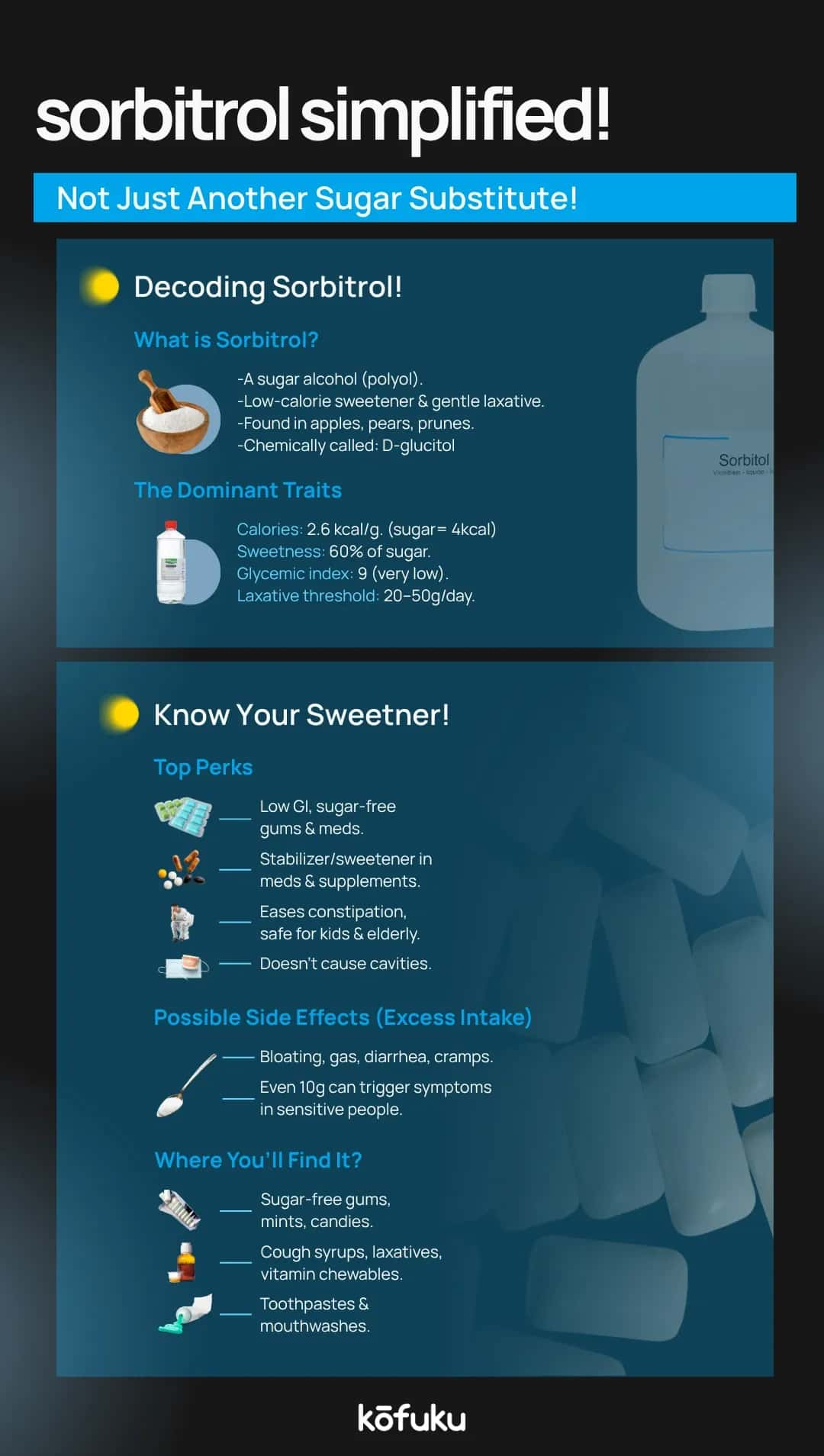What is Sorbitol? Benefits, Tablet Uses, Side Effects and More

Introduction
Sorbitol is a type of sugar alcohol that is often used as a low-calorie sweetener in a wide range of foods, beverages, and also for medical uses. It can be found in nature in some fruits, such as apples, peaches, and prunes, but is also manufactured synthetically and used in a variety of products, including sugarless gums and sorbitol tablets.
This article will highlight the uses of sorbitol tablets, potential side effects, and why sorbitol is used in health products, as well as in some cosmetics.
Common Forms of Sorbitol in The Market
Sorbitol is available in many different forms, and some of them are:
Sorbitol tablets: For therapeutic or supplement use. Sorbitol powder: Used by the pharmaceutical and food industries. Sorbitol solution: It’s commonly used in medical preparations and intravenous infusions.
Each form of sorbitol has different uses, though they function similarly in the body, as a sugar substitute and laxative.
Understanding Sorbitol Tablets: What are They Used For?
Sorbitol tablets are often prescribed or used for:
- Mild constipation (as a laxative)
- Liver function test (in some diagnostic cases)
- Sugar substitute for diabetes or sugar-restricted diets
Benefits of Sorbitol Tablets for Digestive Health
Sorbitol tablets have a significant impact on the gastrointestinal tract. They work as an osmotic laxative, drawing water into the intestines and stimulating bowel movement.
This makes them particularly useful for:
- Individuals with some constipation problems
- Patients who have had surgery and need to regulate their bowels gently
- People who cannot tolerate aggressive chemical laxatives

Sorbitol Powder and Solution: What’s the Difference?
Sorbitol powder is used in pharmaceutical compounding and as a food additive, whereas the sorbitol solution is used in medical formulations such as:
- IV fluids, oral syrups, and sugar-free medications.
- Used as a stabiliser in some vitamin-C preparations and laxative syrups.
Polyols May Have Laxative Effects: What Does It Mean?
You may have noticed a warning on some sugar-free products that states: "Polyols can have laxative effects." But what does that exactly mean?
What Is the Polyol Laxative Effect in Sorbitol?
Sorbitol is a part of a group of sugar alcohols called polyols. The body does not fully absorb polyols in the small intestine, so they travel straight to the colon, where they draw water into it.
This osmosis can lead to:
- More frequent bowel movements
- Softer stool
- Possible cramping or bloating at higher dosages
Therefore, the term "polyols can have laxative effects" basically means that they can act as gentle stool softeners or laxatives when you consume them in large quantities.
Side Effects of Sorbitol Tablets You Should Be Aware Of
Sorbitol is usually safe, but you should be aware of the possible side effects of sorbitol tablets, particularly from long-term use or high doses:
- Abdominal pain
- Gas and bloating
- Nausea
- Diarrhoea (especially at doses above 20g/day)
While sorbitol is deemed safe, those with irritable bowel syndrome (IBS) or a sensitive digestive system should be careful before taking sorbitol, as symptoms may get worse.
How to Take Sorbitol Tablets Safely
- Follow your doctor's prescribed or label-recommended dose.
- Do not combine it with other laxatives unless instructed by your doctor.
- Drink plenty of water to help with digestion.
- If it's your first time using sorbitol, then start with a low dose.
- If you continue to experience unwanted symptoms such as cramping, loose stools, etc., reduce your intake and consult your doctor.
Sorbitol for Skin: Is It Safe in Cosmetics?
Sorbitol can also be found in skincare and cosmetic products as it attracts and retains moisture. You can find sorbitol in:
- Moisturizers
- Toothpastes
- Cleansers
- Lip balms
Is it safe?
Yes, sorbitol is classified as non-toxic and non-irritating. It's typically safe for topical applications to most skin types, including sensitive skin.

Can Everyone Use Sorbitol-Based Products?
In general, yes, but there are a few exceptions. If you’re considering using sorbitol-based products, then don’t forget to consult with a doctor before making any drastic changes to your routine.
Is Sorbitol Safe for Children and Pregnant Women?
Children
Generally considered safe for occasional use in cases of mild constipation. However, excessive doses may cause diarrhoea or cramping. Always talk to a paediatrician before using it on children.
Pregnant Women
There are no harmful effects of sorbitol if it is used moderately. However, as a precaution, it is always best to discuss using sorbitol tablets or sorbitol solutions with your doctor if you’re pregnant.
Final Thoughts: When to Use and Avoid Sorbitol Tablets
Sorbitol tablets can provide safe, effective, and gentle relief for acute constipation, support liver function, and serve as excellent alternatives to sugar. They’re widely used in medical, food, and even skin care items.
However, you should ensure that you understand the laxative effect if you have a sensitive digestive system or use it in excess.
When to Use Sorbitol tablets:
- If you need mild relief from acute constipation
- For managing your sugar intake
- If your doctor has suggested diagnostic use
When to Stop or Limit Use of Sorbitol:
- If you have chronic GI disorders
- You have ongoing diarrhoea and bloating
- If you’re taking other laxatives
As in most things in life, anything in excess is not good for you. When it comes to the use of sorbitol, moderation and a prescription are very important. Sorbitol can be part of your overall health plan, but before you commit to it, ensure it’s the right choice for you and your body.

FAQs
Q. What is sorbitol used for in tablets?
A. Sorbitol tablets can be used as laxatives, sweeteners, and stabilisers in oral and digestive medications.
Q. What are the side effects of sorbitol tablets?
A. The most common side effects are bloating, gas, cramps, and diarrhoea, particularly in people with IBS and people sensitive to sugar alcohols.
Q. Can sorbitol help in constipation?
A. Yes, sorbitol pulls water into the colon, softens formed stool, and provides some help with occasional constipation.
Q. What does it mean when polyols have a laxative effect?
A. Polyols pull excess water into the intestines can cause diarrhoea or loose stool when consumed in excess.
Q. Is sorbitol safe for skin and cosmetics?
A. Yes, sorbitol is safe. It is used in cosmetics to hold moisture in the skin, making the skin feel extremely hydrated.





